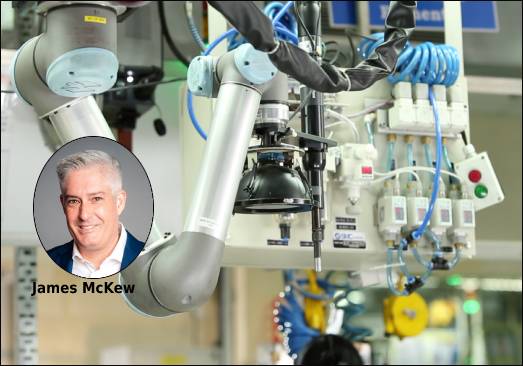
By James McKew, Regional President Asia-Pacific, Universal Robots
June 23, 2022: For decades, robots have played a crucial role in industrial manufacturing. And it is their power of repeatability, speed, flexibility and accuracy that has given these automated and partially-automated machineries a prominent role in operations for the food and beverage (F&B) industry. Robotics has made it possible for the F&B industry to vastly increase its manufacturing facilities of all types and sizes worldwide.
The global health crisis, followed by increased demand for safe and hygienic food items, further accelerated the need for fewer human touch points and innovative technologies such as automation and robotics. Additionally, today’s consumer is environmentally conscious; hence, they want to learn more about how the products are manufactured and delivered. As a result, businesses in this segment further expedited the adoption of innovative technologies such as automation and robotics.
Keeping the rise in adoption of automation in view, industry leaders expect a sharp surge in the next few years. According to research by Meticulous Research, the food automation market is expected to grow at a CAGR of 9.5 per cent from 2020 to 2027 to reach USD 29.4 billion by 2027. Organisations are vigorously implementing modern digital solutions and technologies such as collaborative robots (cobots) in their operational processes to improve work efficiency and production quality while reducing overall costs.
Nowadays, organisations in the F&B supply chain are using cobots in a wide range of secondary processes such as packaging and machine tending. Cobots are among the most popular choices for businesses in this segment because they are compact and perfectly fit in a human-robot environment
Common applications of Cobots in food industry
One of the primary issues faced by the food industry is to pick, pack and palletise the items in tight deadlines. Cobots are ideal as they can work around the clock without breaks and this is especially helpful during seasonal bursts, when additional help is needed to process sudden increase in workload.
For instance, Unilever, one of the world’s largest FMCG companies utilises UR10 cobots to shorten palletising time, optimise work ergonomics and relieve workers from the strenuous and monotonous tasks of packaging and palletising. Before automating the process with cobots, operators spent an estimate of 70% of their time packaging and 30% of their time palletising. After automation, operators spent 30% less time on these tasks.
Cascina Italia is another company which implemented a cobot solution in its packaging process, to handle around 1.5 million eggs per day on one of their 24 production line output stations. The small and compact size of cobots are installed directly along the production line without sacrificing valuable space, and relieves operators from the most arduous process of preparing boxes on the packaging production line.
In recent years, the application of cobots has proven to be extremely useful in palletising, especially in companies with limited floor space and a tight budget. Typical palletising robots requires substantial floor space with safety caging. Nortura, a meat producer, wanted to optimise palletising but was unable to use a traditional palletising robot due to the extensive space required. With the help of a robotics integrator, they implemented a cobot solution with a customised vision system for an innovative small-footprint approach and used less than 20 percent of the space that a traditional robot would have required.
Cobots are revolutionising the production process, including food manufacturing, with every passing day. The technology will continue to provide the industry with advantages of optimised and streamlined production and cost-effectiveness. There has been a rise in acceptance as well as the inclusion of these cobots in the recent past. Although, as an industry, numerous opportunities are yet to be explored.
James Mckew has experience of more than 27 years in the industry. He has expertise in handling diversified sectors such robotics, technology, automation, packaging and processing, chemical manufacture, food and beverages many more
Universal Robots is at the forefront of technology, enabling Human Robot collaboration that makes industrial automation safe, easy, and accessible for businesses of all sizes, who are able to automate and streamline repetitive industrial processes.